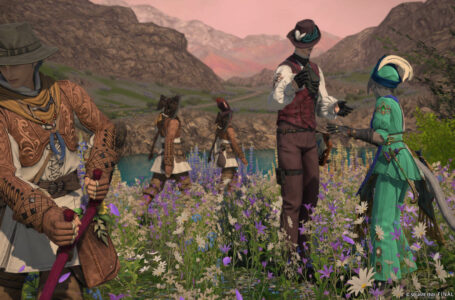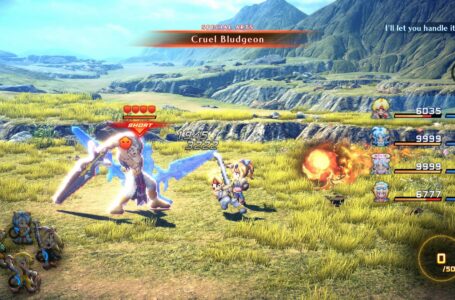The Returner: Heavensward shows how well “dark Final Fantasy” can work
I knuckled down and powered through all of Heavensward’s main story in Final Fantasy XIV this week, marking another major milestone in my New Game Plus run.
Throughout Heavensward, I was struck by something: how well it works as a story. In fact, I feel like I enjoyed it more this second time around than I did first time through. Perhaps part of this can be attributed to noticing how much foreshadowing there is for much later story material throughout Heavensward as a whole — but most of it comes down to recognising and appreciating how well its take on “dark Final Fantasy” works.
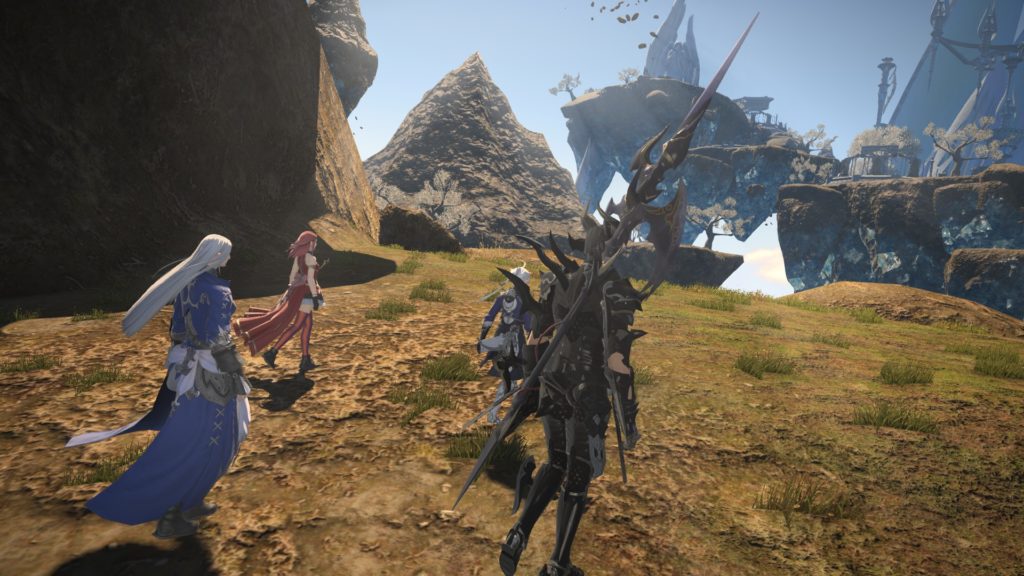
Final Fantasy as a whole is no stranger to bleakness, of course; most of the mainline installments in the series feature moments of significant tragedy that often act as an impetus for the game’s heroes to push on and achieve their goals. But there’s something particularly distinct about Heavensward; it’s less about moments of bleakness and the hope that can spring out of them, and more about a near-constant sense of melancholy.
The core conflict at the heart of Heavensward — the Dragonsong War, between the Ishgardians and the Dravanians — has been raging for a thousand years at the time we join the action, after all. And there’s the sense right from the beginning of Heavensward’s story that no-one is particularly satisfied with this; everyone is born into the war, and is just forced to accept that that is how things are.
Some people take to this more readily than others, of course; slaying dragons is the stuff of heroic legend, whatever world you hail from. But others detest the fact that they have to live in constant fear — both of the Dravanians, for being an ever-present threat, and of the Ishgardian church, which is more than happy to clap anyone it considers a “heretic” in irons and fling them into the nearest chasm, as we see during one memorable sequence back in A Realm Reborn.
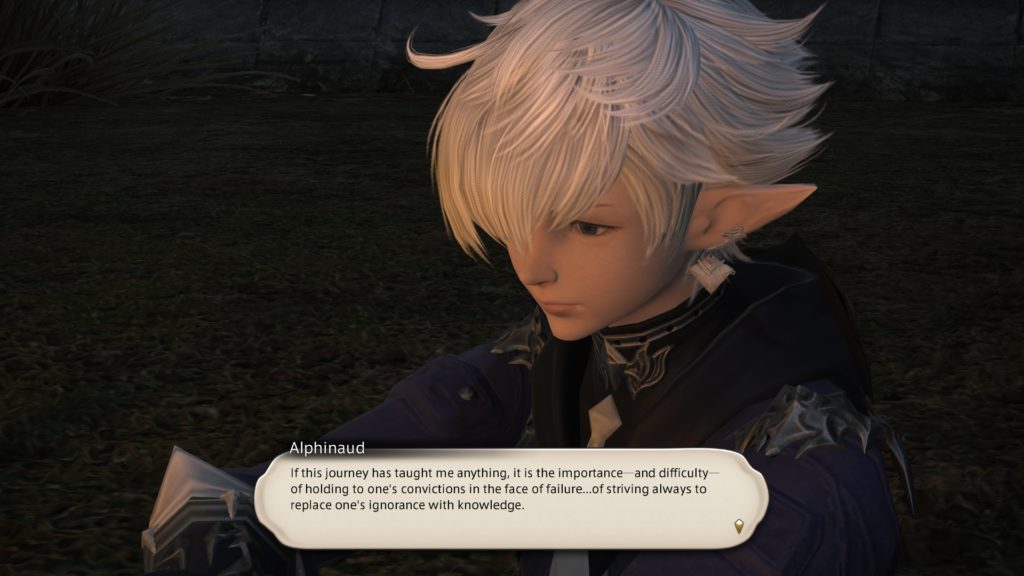
This melancholic atmosphere is helped along enormously by the downbeat ending of A Realm Reborn’s patch cycle, of course. Forced to flee the city of Ul’Dah after being falsely accused of the assassination of Sultana Nanamo Ul-Namo, you and the Scions of the Seventh Dawn — the main characters for the majority of A Realm Reborn’s narrative — are scattered through both natural and magical means, and as Heavensward gets underway, it’s just you and a rather morose Alphinaud, who continually blames himself for how things went down.
All this is important, of course; it’s a significant moment of character growth for Alphinaud in particular, who was positioned as a rather obnoxious, arrogant individual on your first meeting with him in A Realm Reborn. He gradually softens as he realises quite how capable you, the Warrior of Light, really are — and by how much your own abilities outstrip his own — but it’s not until his utter ruin towards the end of A Realm Reborn’s patch cycle that he is truly able to begin a new life and focus on what is truly important.
Heavensward is filled with melancholy and tragedy, and even the great victories you score along the way to discovering the truth of the Dragonsong War are tinged with a sense of regret. Several dungeon runs throughout the main story feature unavoidable conflicts that could potentially end up making matters worse before they get better — and it’s hard not to empathise a little with major antagonist Nidhogg’s rage when you get to the bottom of what really happened a thousand years ago.
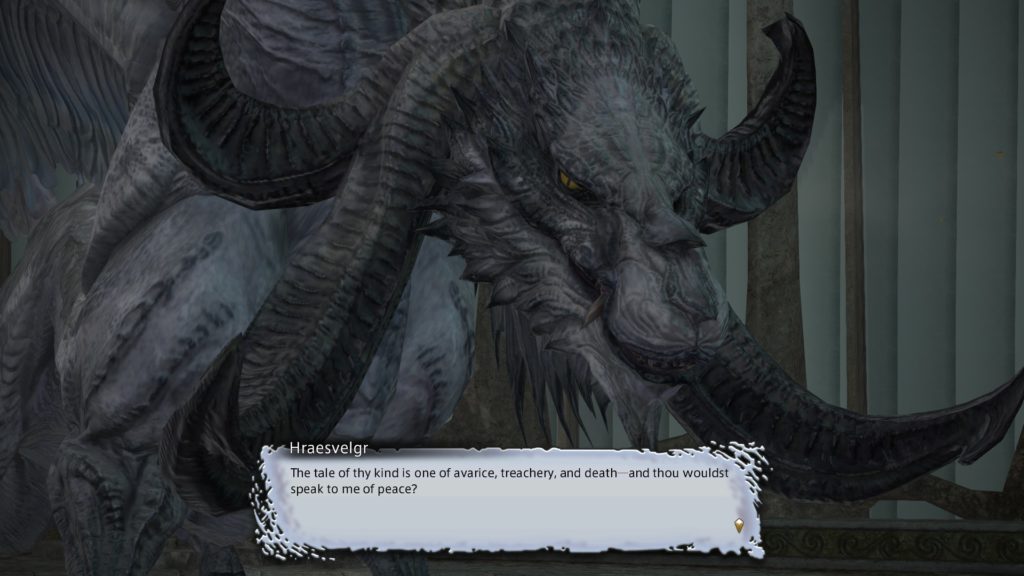
But somehow it never gets exhausting. Heavensward wisely punctuates its melancholic atmosphere with moments of unexpected whimsy. The peculiar landscape and beautiful blue skies of the Sea of Clouds; the manipulative moogles of the Churning Mists; the deadpan delivery of the Allagan devices atop Azys Lla towards the finale of the main scenario. In a lot of ways, it’s the inverse of your typical Final Fantasy — rather than being colourful and whimsical with moments of melodrama and tragedy, it is instead melodramatic and tragic with moments of whimsy. And it works really well.
It works especially well in the context of an MMO, because playing an MMO often feels like a constant uphill struggle — particularly once you get to the endgame. Your next goal is always just out of reach, be it that shiny new piece of gear or progression in the raid you’re working on. You can’t be complacent; you need to always be striving to better yourself, even though you know there’s not necessarily a real “end” to your struggles.
And indeed, Heavensward’s narrative reflects this side of things, too. When you reach the conclusion of the 3.0 story, bust into the Aetherochemical Research Facility and flatten a couple of Ascians before taking on King Thordan himself, you know that this is a significant moment — but it’s not the end. And indeed, the stories told in the patch cycle for Heavensward reinforce this; much as some people resented being born into a war they didn’t start, others resent having the only life they’ve ever known taken away from them through unexpected and sudden change.
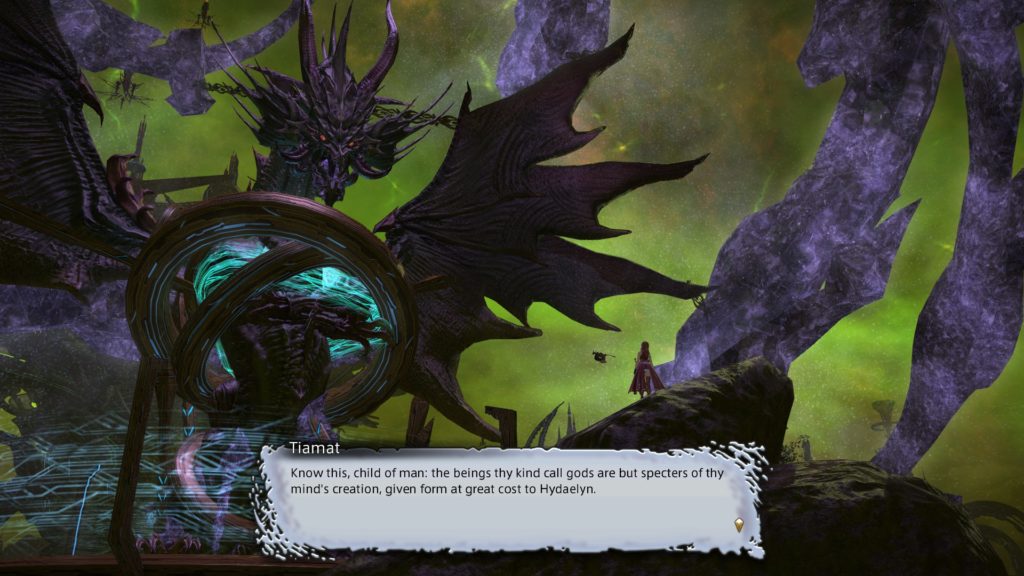
Even as you leave Heavensward behind and move on into Stormblood, it’s clear Ishgard’s struggles are far from over. Deep-seated beliefs don’t change in a single day, after all — or even a year or two. These things take time, effort and often a not-insignificant amount of pain. Heavensward’s main story reminds us that a hero’s journey can be one of great sadness and uncertainty as much as it can be one of triumphant hope; however much you might have achieved in the past, it’s always important to remain humble, because you never know what new challenges might be waiting just around the corner for you.
Join The Discussion
Rice Digital Discord
Rice Digital Twitter
Rice Digital Facebook
Or write us a letter for the Rice Digital Friday Letters Page by clicking here!
Disclosure: Some links in this article may be affiliate links, which means we may earn a small commission if you make a purchase after clicking on them. This is at no additional cost to you and helps support Rice Digital!
- Letter from the Editor: passing the torch - June 30, 2023
- Super Woden GP 2 is looking promising - June 30, 2023
- Inti Creates is making a 32 bit-style Love Live action platformer - June 26, 2023





